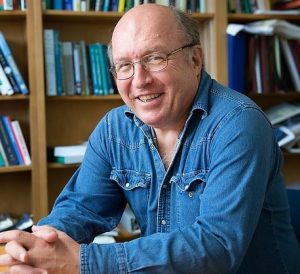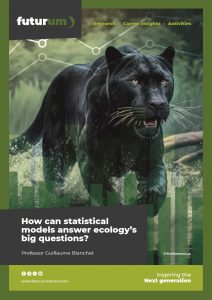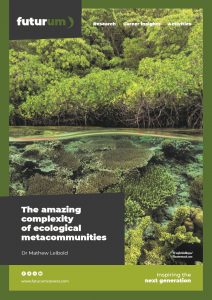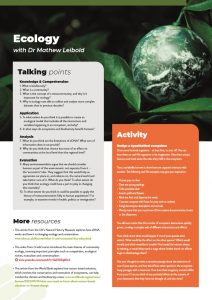The amazing complexity of ecological metacommunities
Ecosystems are hugely complex. Every animal, plant, fungus and microbe is interacting with countless others, as well as with their ever-changing environment. Understanding these intertwining relationships is highly challenging, but Dr Mathew Leibold, from the University of Florida in the US, believes it is possible. He champions the concept of ‘metacommunities’, which can help us appreciate how ecosystems function and are affected by human activity, and how we can conserve our natural world.
Talk like an ecologist
Biodiversity — the variety of life found across a particular area/habitat
Community — in ecology, a group of species that are commonly found together
Dispersal — the movement of individuals or groups away from the area where they were born, to another location where they settle and attempt to reproduce
Ecology — the branch of biology that studies the relationships of organisms with one another and with their environment
Ecosystem — a community of interacting organisms, and their physical environment
Environmental DNA (eDNA) — DNA shed from an organism or ‘left behind’ in an environment that can be sampled to identify the species in an area
Invasive species — a species that causes harm in an environment where it is not native
Local scale — an area where species could, theoretically, all come into contact together
Metacommunity — in ecology, a set of interacting communities linked by the dispersal of potentially interacting species
Regional scale — an array of local communities that can be suitably bounded and could be larger than a metacommunity but need not be
Pollutant — a substance that is harmful to the environment
Biodiversity describes the variety and abundance of life found on our planet. An ecosystem’s biodiversity broadly refers to the makeup of different species found within it. “Biodiversity is beautiful for its own sake,” says Dr Mathew Leibold, from the University of Florida’s Department of Biology. “Moreover, there is plenty of evidence that high biodiversity is important for maintaining ecosystems that are useful to humans.” Benefits of intact ecosystems are countless – they can provide us with food, fresh water, defence against natural disasters, new medicines, and much more.
Every species in an ecosystem interacts with others; predators depend on prey to feed, plants depend on predators to keep herbivore numbers down, and so on. Higher biodiversity leads to a more complex ecosystem, especially as species affect each other in complex webs of interaction, and this complexity is important. For instance, if a species within a complex ecosystem becomes extinct, chances are that there will be other species that fulfil a similar role that can take its place. If a species in a simpler ecosystem becomes extinct, however, this can have knock-on impacts on other species which could eventually lead to the collapse of the whole ecosystem.
Introducing metacommunities
“If we think that biodiversity is important, we need to understand how it is generated and maintained across the landscape,” says Mathew. “This means how environmental conditions, interactions among species, dispersal and chance events all interact to determine how species are spread out in a landscape.” Historically, much of ecology has focused on understanding these interactions at the local or regional scale, but neither of these approaches provide the full picture. “Considering only one scale doesn’t do much to bring all interacting factors together,” says Mathew. “That’s why the idea of metacommunities arose.”
The concept of metacommunities involves considering all possible factors affecting biodiversity in one integrated approach. In ecological terms, a community is a group of species commonly found together – the species that make up a particular ecosystem. A metacommunity is a set of local communities, interconnected by at least one (but often many) species moving between them.
Breaking it down
Mathew encourages initially simplifying the concept to help build understanding. “If we focus only on pairs of species, we can identify elemental ideas,” he says. “For instance, we can look at how environmental differences affect species interactions – one of the two species may be favoured under a specific local condition, such as a higher altitude, while the other is favoured by a lower altitude. Think about different plants being found at different elevations on a mountainside.”
Adding in immigration and emigration – moving in and out of a local area – adds a level of complexity. “Species often disperse to places where they aren’t able to be successful in the long term,” explains Mathew. “In this place, they become ‘sink’ populations, where the species only persists in this area because of immigration of ‘source’ populations from other areas.”
There is also the power of chance. Whether a species survives or goes extinct can depend a lot on luck rather than any specific influence, especially at the local level. “In some cases, species may be so similar that they are ecologically identical, and it is random chance that keeps them in the system for long periods of time,” says Mathew. “Eventually, chance may drive one or the other of these similar species to extinction.”
And finally, there are the species interactions themselves. Interactions between species at one locality can affect what happens elsewhere, as ecosystems are connected by dispersal.
These dynamics are well-understood in isolation, but the issue is that all of these effects are happening, all the time, to a broad array of constantly interacting species. “Considering only pairs of species is similar to thinking that we can understand how the brain works by understanding how only two neurons interact!” says Mathew.
Technology opens doors
Reference
https://doi.org/10.33424/FUTURUM453
Mathew with colleagues at Institut Natura e Teoria en Pirineus after working hard on theoretical ecology
All images © Mathew Leibold unless stated otherwise
Historically, the tools have simply not existed to adequately address this level of complexity, but this is now changing. “There are new exciting approaches emerging that make it possible to sample, analyse and think about metacommunities in new ways,” says Mathew.
Environmental DNA, or eDNA for short, is one such breakthrough. eDNA involves taking samples from soil or water and extracting DNA that has been ‘shed’ by species passing through that environment, to build up a picture of the species present without having to directly find them. “This means we don’t have to work hard to collect organisms with butterfly nets or mammal traps, for instance,” says Mathew. “With eDNA, we can sample more frequently, and in more places, to build datasets that would have been unimaginable in previous decades.”
Analysing this data stream (one might call it a ‘hose’) is the next challenge, but the growth of computational power is making this possible too. “We can develop computational methods that allow us to reveal very complicated patterns in the data,” explains Mathew. “The use of artificial intelligence is an especially major development, and its power is improving substantially every month, sometimes every week.”
Increased communication and collaboration between scientific fields is also making new techniques possible. “We can borrow methods from physics based on ‘statistical mechanics’. These can give us important answers without having to understand all the detailed parameters driving ecosystem dynamics, which can often cancel each other out and end up looking random,” explains Mathew. “Working in this area requires some special skills and training, so it is important to collaborate with people with different areas of expertise.”
Humanity’s relationship with nature
Biodiversity is currently in crisis, with overall wildlife populations estimated to have fallen by around 70% since 1970. “Human activities are changing most, or maybe even all, of the rules and parameters in play,” says Mathew. “We can’t ignore the effects of these activities when we study ecosystems.” Humanity itself is an especially complex species – affected not only by its environment and other species but also by economics, politics, philosophies, culture and many other factors. “If we can identify the core principles of metacommunities and apply them to realistically complex systems in relatively simple ways, we can also include the human perspective,” says Mathew. “This could help us be more effective at conserving biodiversity, while also maintaining human welfare.”
Mathew has been working on various aspects of this field of human-nature interactions. “One topic is how pollutants are affected by biodiversity,” he says. “It turns out that some ecosystems accumulate pollutants that enter from elsewhere, while other ecosystems are pollutant ‘diffusers’ – pollutants accumulate in organisms at the top of the food chain, namely predators, which then disperse to other ecosystems.” Mathew is also studying the effects of multiple invasive species and how their interacting effects can impact ecosystems. “Most previous work has focused on single invasive species, but invasives don’t just come one at a time, and we need to understand what happens when many are acting together.”
Finally, Mathew has been puzzling over the role of evolution. “Most prior work has assumed that species are static – that they don’t change in terms of their ecological function,” he explains. “However, we know that this is not necessarily always so.” Species adapt to their environment, so including this adaptation within the already-complex metacommunity approach will be important to get the full picture. “The fascinating thing about metacommunity ecology is that it seems to ask new questions at least as fast as we solve them,” says Mathew. “But for someone who wants to be creative, this is an amazing area to work in!”
 Dr Mathew Leibold
Dr Mathew Leibold
Department of Biology, University of Florida, USA
Fields of research: Community ecology, aquatic ecology
Research project: Using the concept of metacommunities to understand complex interactions of species within ecosystems
Funder: US National Science Foundation (NSF)
About ecology
Ecology is an important field for addressing the ongoing biodiversity crisis and to conserve and restore our most precious ecosystems, as well as to understand how humans affect, and are affected by, the natural world. Mathew explains more about his field.
“The field of ecology is changing quickly, and lots of opportunities are opening. This is partly because understanding ecology is important for protecting biodiversity and conserving ecosystems, and partly because technological developments mean that future ecology will be using new and ‘yet to be discovered’ methods. Nevertheless, there will always be a need to confirm these ideas with the old-school ‘muddy boots’ approach, which calls for field experiments and an understanding of natural history.
“I also think that ecologists will have tremendous opportunities to improve policy, through developing a deeper understanding of how natural ecosystems interact with human activities. I’m not totally sure how this will work, but that’s up to the next generation to figure out!
“Working closely with other specialists is vital for effective ecology. Personally, I’ve found that my ‘niche’ is to learn enough about all the most recent developments to be able to suggest ways to combine them, and then to identify more specialised scientists to collaborate with. It’s amazing how interesting and exciting this process has been. For instance, working closely with statisticians is essential to understand the most recent developments in artificial intelligence.
“A strong understanding of mathematics has always been helpful to me. Mathematics is useful to make sure that your arguments are logical. Ecology is complicated enough that you can’t always trust your intuition to make conclusions!
“My main focus now is to incorporate the statistical mechanics approach into metacommunity thinking. I’m working with some brilliant colleagues with experience in the mathematics involved, and I believe we can really make some progress working together.”
Pathway from school to ecology
• Mathew recommends taking mathematics and biology at school and post-16, as well as ecology if it is available. He also notes the importance of a broad education, saying that new ideas and ways of thinking can come from anywhere – be it philosophy, history, literature, and so on.
• At university, subjects that can lead to a career in ecology include ecology, zoology, conservation biology and environmental science.
Explore careers in ecology
• Ecology careers can vary hugely. Ecological scientists carry out research within academia. Consultant ecologists investigate the impact of human activity on ecology, assess the ecological traits of sites and can contribute to policy. Landscape ecologists do hands-on work to manage and monitor ecosystems. Mathew recommends getting a taste of any appealing careers as soon as possible, such as through work experience in labs.
• Mathew recommends looking into the Ecological Society of America, as well as other societies such as the American Society of Naturalists, the Association for the Sciences of Limnology and Oceanography, and the Society for Conservation Biology, depending on your specific interests. All have outreach programmes for young scientists.
• According to Indeed, the average salary for an ecologist in the US is around $73,000 per year.
Meet Mathew
Somehow, I always knew that I wanted to study nature. I have always found the complexity and natural history of organisms beautiful and fascinating. Also, I was fortunate to have a great high school teacher, Miss Velasco, who inspired me to push on to college.
I was so lucky to get connected with an ecologist in my second year of college. I even got paid to do it! But most importantly, I was able to interact with graduate students and my ‘boss’, which gave me an idea of what it would look like to progress further in an ecology career. I think this is where I learnt what it took to be a scientist.
Getting the metacommunity idea going was a hugely important experience in my career. The word existed beforehand but descriptions varied, so a colleague of mine suggested that I organise a ‘working group’ to establish the concept. We invited folks with a variety of approaches, and the ensuing work allowed us to propose a much greater synthesis of ideas than any of us could have individually. I discovered that I enjoyed this kind of interactive and synthesis-oriented work, and that I was pretty good at it.
I am proud to have found a way to balance all my life’s priorities. I am true to my family and other ‘non-science’ things, while also being productive as a scientist and helping to take ecology to a new level.
In the future, I want to find a way to take the basic ideas of community ecology and resolve how they can explain the realistic complexity of natural communities. I will always be exploring how we can use metacommunity ecology to better understand nature.
I think ecology is a crucial science for humans. What we can discover and communicate will define how humans relate to nature. Sometimes nature is pushed aside in favour of economic and social needs, but I believe this ignores the importance of natural ecological processes for the future of our planet and for ourselves.
Do you have a question for Mathew?
Write it in the comments box below and Mathew will get back to you. (Remember, researchers are very busy people, so you may have to wait a few days.)

Learn about how statistical models are being used to answer ecology’s big questions:
www.futurumcareers.com/how-can-statistical-models-answer-ecologys-big-questions









0 Comments